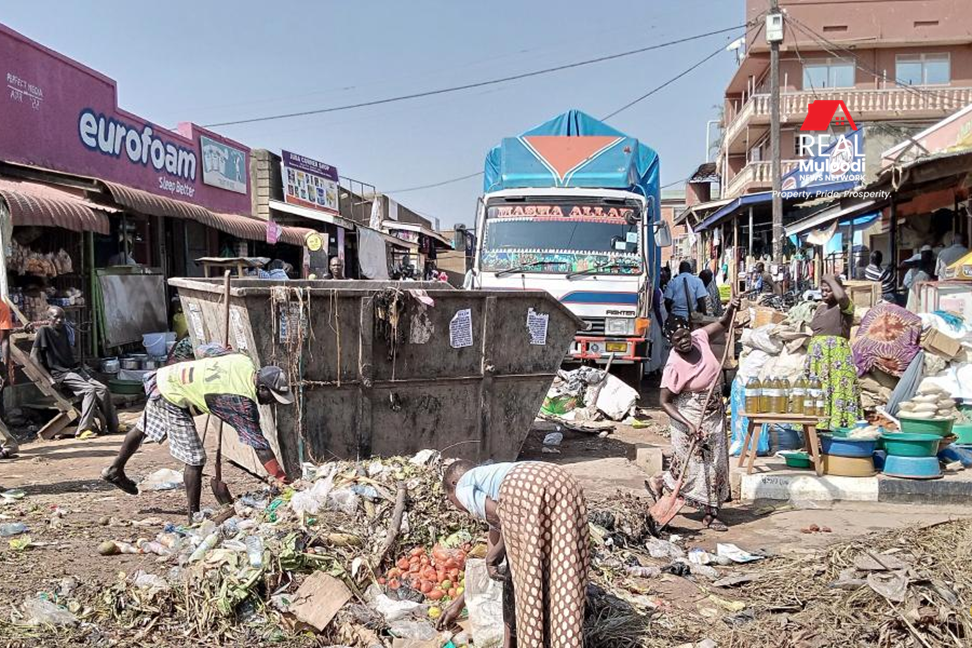UGANDA, Arua | Real Muloodi News | Six years ago in 2015, Arua was hailed the second cleanest small city in all of Africa. A mere 3 years later in 2019, Arua ranked as the dirtiest town in Uganda, according to a report by the World Bank group.
Today, after officially attaining city status Arua City is still considered the filthiest of Uganda’s 11 cities, chocking on mountains of rotting, uncollected garbage. In addition to the stench and marauding flies that plague the city, the uncollected garbage could lead to the outbreak of diseases.
After being named the filthiest town in Uganda, the previous Municipality Authority had attempted to deal with the stinking waste in the town under a campaign dubbed ‘Keep Arua clean.’
However, with a shortage of garbage bins, ineffective contractors and limited resources to effect meaningful change, the crisis has dragged on. Several skips that were acquired while Arua was still a town are now dilapidated, the worst of which have been disposed of as scrap.
Therefore, the current Arua City Administration is still faced with an acute shortage of garbage skips, which continues to threaten garbage management.
Arua City currently has only two functional garbage skips, far too few to serve the 22 garbage collection sites of the City.
The shortage of skips has contributed to the growth of unsanitary and messy landfills of along Idi Amin Road and on Duka Lane in Central Division.
Meanwhile, areas including the entrance to Arua Main Market, the Arua Hospital lower gate, and behind the Arua OPM Office have continued to harbor huge filthy mounds of uncollected garbage.
The challenges regarding waste management are compounded by the city’s ever-growing population. In 2020, the Arua City population was projected at 361,400.
In addition to being a central business hub attracting more and more people to Arua City every day, the city’s location in the West Nile sub region with its close proximity to Democratic Republic of Congo and South Sudan means it sees an continual influx of refugees.
It is estimated that the population of Arua City currently generates over 70,000 tonnes of garbage daily, but according to records from city health and environment office, less than half is collected.
Further, the city does not have a central sewage system, posing an additional threat to health and waste management. It means Arua is prone to cholera outbreaks, with fecal matter strewn throughout the piles of garbage.
How Arua City will Deal With the Uncollected Garbage Crisis
Paul Batanda, Arua City Clerk, acknowledged the challenge of Arua’s uncollected garbage. He says that in November last year, Arua City procured two trucks under Uganda Support to Municipal Infrastructure Development (USMID) project which are now being used for garbage collection.
Batanda explains that City Leadership made a further effort to procure over 20 new garbage skips under the USMID project, however their application was rejected.
Therefore, Batanda says efforts are already in place to find alternative sources of funds to procure new skips for the city.
One of the avenues Arua City Leadership is looking to raise the raise its own revenue to address the issue, is through property rates (property tax).
Arua is set to undertake the valuation of all commercial properties in the city, targeting commercial properties that will be taxed over the next five years.
Anyone who owns a building which is used for business purposes in Arua City (including residential rented properties) will be eligible to pay the tax. However, owners of residential dwellings where the owner resides, or of vacant land, will be exempt.
The property valuation exercise is being supported by USAID, as part of the Domestic Revenue Mobilisation for Development (DRM4D) project.
The DRM4D project is also supporting property valuations in the other 9 municipal towns that also acquired city status in 2020, being Mbale, Soroti, Hoima, Fort Portal, Jinja, Mbarara, Masaka, Lira and Gulu.
The valuation activity will be conducted in accordance with the local Government Rating Act 2006. It has already commenced in the majority of new cities, with the goal to be completed within the next three months so that revenues needed to fund services such as garbage collection can start to be realised in the new financial year, starting July 1st.
In the meantime, Arua city mayor, Sam Nyakua, says the council is also looking to put efforts to cause behavioral change to encourage city dwellers to safely dispose of waste.
READ MORE LIKE THIS:
Four People Survive Death After Building Collapse in Masaka City
Fort Portal City: Physical Planning Needed to Stop Recurring Fire Outbreaks



